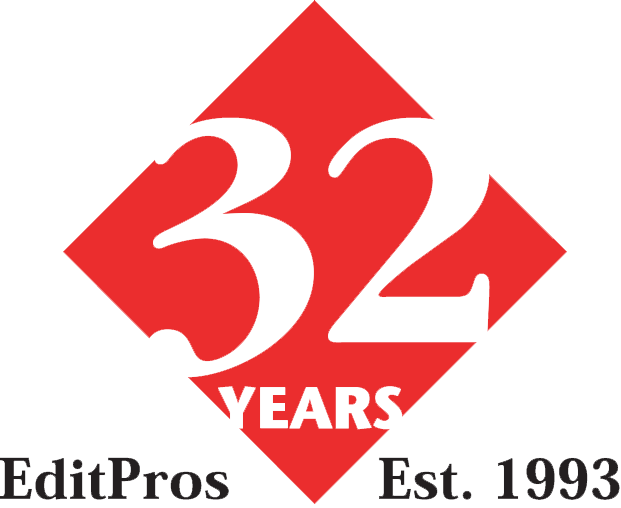Newsletter and Grammar Coach
AUGUST 2025 | Vol. 29, No. 8
Monthly information digest for EditPros clients and friends
Call us weekdays: 530-759-2000
| |
CONTENTS
| |
After 32 years in business, we will turn off the lights and lock our office door in downtown Davis for the last time on or before August 31. We’ll shut down our www.editpros.com website and associated email addresses as well. But our email accounts have hummed with activity since we announced that we are retiring EditPros LLC. We received scores of messages from clients and friends expressing surprise, and offering congratulations and thanks, and some were tinged with melancholy.
The touching messages that we received included these:
“Dear Jeff and Marti, sorry to read EditPros will be closing and wish you both the best of luck in your new chapters. I really enjoyed reading about your history and can relate to some of it being a ‘secretary’ since the late 1970s to current; thank you for sharing.”
— Diane D., executive services manager
“Hi, Jeff and Marti. I am happy for you that now you can relax more and enjoy life, but sad we are losing a great business partner with your retirement. Thank you for all the writing support you provided to our clients over the years. They were very complimentary on your professionalism and creativity. I will miss working with you, but I know you are excited to move on to the next chapter of your life. Good luck and enjoy.”
— Jim S., web and graphic design firm owner
“It was always a pleasure working with you, sometimes under tight deadlines. Despite that you were always professional and had a smile on your faces. Best to you in your next adventure.”
— Cathy B., retired mental health agency consultant and university lecturer
“A good run … and thank you. I will keep Marti in mind if a self-publishing opportunity arises.”
— Roger P., book ghostwriter and business writer
“Jeff and Marti: I’ll sorely miss your newsletter for the great info you provided. Congrats and good luck as you move on to your next professional and personal adventure. Working with you was such a pleasure. Thanks for all your great work for me and [the alumni engagement office]. I’ll be keeping an eye out for your news about your updated books. Take good care!”
— M.L.F., retired university alumni program director

“All congrats to you. Always good to go out at the top of your game.”
— Doug B., voice-over announcer and audio producer
“I’ll miss your monthly emails — especially the Grammar Coach, which each month shows me how little I know. Enjoy retirement.”
— Jim D., retired advertising agency owner
“I saw that announcement. What a huge step for you. I am glad pieces will still go on. You are such an amazing resource!”
— Mike M., developer and consultant, navigation technology for people who are blind
“Thank you, Jeff and Martí. Although I have been retired for some years, I still remember the assistance you gave the lab system in its formative years and beyond. After retirement I have always looked forward to regularly receiving the EditPros newsletter.”
— Alex A., retired director, livestock health monitoring laboratory
“Just read the news of the last days of EditPros. What a wonderful run you’ve had — a testament to perseverance and grit. Also guts. I appreciate the advice you were always generous with, along with the referrals. I’ve also retired from the editing biz, so I can speak from experience when I say that retirement or no, you’ll be silently correcting grammar forever. All the best to you both!”
— Barbara A., fellow editor
“We’re sad because you have been such a tremendous help to us, but we're also very happy for you both as you enter retirement. We would be very appreciative if we could sneak a few articles your way before the end of summer. Thank you so much for all that you have done!”
— Ashley H., content director for a college faculty association
“Hi, Jeff and Marti. Even great things have to end! We loved working with you for about 19 of your 32 years.”
— Daniel C., retired mental health policy analyst and researcher
“Congratulations on 32 years and on your retirement! I always enjoyed your thoroughness and attention to detail on the projects we collaborated on. I hope you enjoy this new chapter in your life!”
— Mike H., partner in a leading brand strategy and graphic design firm
“It was quite a run. Congratulations on 32 years of helping authors and writers. Enjoy your retirements.”
— Virginia C., retired deputy attorney general and university law professor
“Congratulations on your well-deserved retirement. You both have been role models for me these past few years as I launched a freelance writing, editing and coaching business. Enjoy your next chapter, and I'm happy to hear that Marti will continue with her business venture. Be well!”
— Dorsey G., fellow writer and editor
Dear friends, thank you for your support in my career. I appreciate everything you did for me. But I’m so proud of you both for the business that you have built over the years. My best wishes.”
— Jim W., retired college visual arts professor
“Congratulations to both of you! Thank you for both for your support and services over the years!! You'll be missed!!!”
— Jenny C., communications and marketing director for a university department
“Congrats on running a business over 3 decades. No small feat! The rest is earned.”
— Martha A., retired university communications program manager
“Congrats on a well-deserved retirement! I loved working with you. Wishing you both well in this next chapter.”
— Michelle S., medical group communications director and consultant
“I appreciate both of you so much. Congrats on your great partnership. Truly admirable.”
— Karen F., retired university news editor
“It was a pleasure to work with you both. Best wishes, do stay in touch!”
— James G., marketing branding consultant and logo design specialist
Thanks for all your great help with the Mosquito Research Program’s Annual Reports back in the day. Congratulations on your retirement!”
— Nancy D., retired university research program manager
As we’ve begun various shutdown processes, we’re finishing previously scheduled work, but no longer accepting new editing or writing assignments. However, our graphic designer and editor Marti Childs will continue operating BookPrep as an independent business. Please see the article below for details. And we have begun the process of updating our four books about hit-making recording artists, under one new unifying title. When those books become available, we will announce them here and on the BookPrep website, and on our own Facebook feeds.
We remain grateful to the hundreds of EditPros clients who entrusted us to write content for them, to edit or proofread documents that they wrote, and to prepare page layouts, and we thank the many people who recommended our services. EditPros would not have endured for as long as it has if it weren’t for all of you. We sincerely thank you for your trust and your friendship. Farewell.
Sincerely,
Jeff March and Marti Smiley Childs
 Link captionDespite the impending closure of EditPros LLC, the BookPrep service that we introduced in 2016 will remain in business. Marti Childs, who is our graphic designer as well as an editor, will become the sole proprietor of BookPrep as she and her husband relocate out of California. The change will be imperceptible to authors because Marti alone has done all the aesthetic formatting and technical file preparation for all BookPrep titles throughout the past nine years, for writers throughout the United States.
Link captionDespite the impending closure of EditPros LLC, the BookPrep service that we introduced in 2016 will remain in business. Marti Childs, who is our graphic designer as well as an editor, will become the sole proprietor of BookPrep as she and her husband relocate out of California. The change will be imperceptible to authors because Marti alone has done all the aesthetic formatting and technical file preparation for all BookPrep titles throughout the past nine years, for writers throughout the United States.
The website will remain  https://www.book-prep.com and Marti is planning no immediate changes to the rate structure. Visit the website to see a gallery of books that have been published with the help of BookPrep services. Previously published titles encompass mystery and adventure novels, memoirs, company histories, children’s books, emotional and spiritual self-help guides, academic textbooks, career and financial development guides, philosophical and theological volumes, instructional handbooks, literary anthologies, and political history accounts.
https://www.book-prep.com and Marti is planning no immediate changes to the rate structure. Visit the website to see a gallery of books that have been published with the help of BookPrep services. Previously published titles encompass mystery and adventure novels, memoirs, company histories, children’s books, emotional and spiritual self-help guides, academic textbooks, career and financial development guides, philosophical and theological volumes, instructional handbooks, literary anthologies, and political history accounts.
Writers who have published their work using BookPrep include teachers, scholars, scientists, military pilots, a physician, a psychic, a social worker and people from other backgrounds.
As part of the BookPrep package, Marti professionally formats the interior pages of each book, designs covers, and readies them for print publication. Writers may choose from among numerous book sizes and formatting options: paperback, hardcover, and hardcover with a jacket.
Some of the authors intentionally restricted distribution of their books, making them accessible at wholesale prices only to family members and friends, an option available with BookPrep. For authors who want to make their books available commercially in both print and digital editions, Marti formats and converts the book files into e-books for sale through Amazon (Kindle), Apple (Books), Barnes & Noble (Nook), and Kobo.
With BookPrep, authors determine retail pricing, they retain all literary rights to their books, and they collect 100% of sales royalties. Most important, you will retain absolute control over editorial content as a self-publisher.
We invite you to  LEARN MORE about the BookPrep service.
LEARN MORE about the BookPrep service.
We do not use any commercial e-mail lists or automated mass-mailing programs, and we do not allow access to the list by anyone else for any reason. Our subscriber list is maintained by hand, and it is not for sale. We are protective of confidentiality because many of our readers are also clients of ours.
Meet EditPros co-owners Marti Smiley Childs and Jeff March.
The EditPros office is in the university town of Davis, California.
Our clients over the years have spanned a broad range of fields.
Normally we write about our clients, but many of them have written “thank you” notes to EditPros.
Earn a reward for recommending us.
Our separate
 Book Prep service helps writers become self-published authors and guides them in managing their books.
Book Prep service helps writers become self-published authors and guides them in managing their books.

